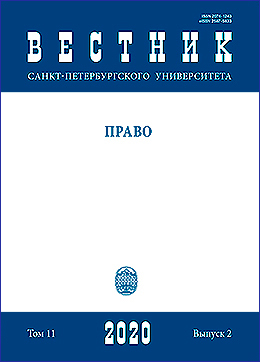The courts of the times of interregnum of the Grand Duchy of Lithuania
DOI:
https://doi.org/10.21638/spbu14.2020.216Abstract
After the death of the last male representative of the Jagiellonian house, Sigismund II Augustus (Polish: Zygmunt August), most of the courts of nobility acting on behalf of the monarch suspended their activities. The nobility fulfilled the resulting deficiency by establishing confederations (called the hoods) in counties and provinces, which became the basis for deputies subsequently elected to the courts during the times of interregnum. They were functioning in the Polish-Lithuanian Commonwealth in the years 1572–1764. They consisted of former court officials and representatives of the nobility and they were mostly housed in castles. The legal basis for the issued verdicts was the general applicable law. The subject-matter jurisdiction of the courts of the times of interregnum mainly involved criminal and fiscal matters, and the deprivation of possessions. They also judged the nobility, as well as the clergy, Jews, peasants and even townspeople and soldiers. Their activities were accompanied by relatively numerous incidents. In spite of this, courts of the times of interregnum quickened the process of executing justice in the times of interregnum. The shorter time of proceedings and structure contributed to this. Introducing procedural improvements were of special importance for a sovereign deprived of his state. The ineffectiveness of courts during the time of remarkably increased delinquency would undoubtedly lead to anarchy. Torture was used in the proceedings held before kangaroo courts. Commencing from 1632, the disputes arising during the election session for the Sejm were settled by a general court of the times of interregnum consisting of marshals, 3 senators and 12 representatives of Małopolska, Wielkopolska and the Grand Duchy of Lithuania. Its tasks involved mainly judging the crimes committed by the nobility, which had arrived in Warsaw for the royal elections. The general court of the times of interregnum made judgments most often in the Warsaw castle.
Keywords:
the Grand Duchy of Lithuania, council of nobility, sejmik, resolution of the council of nobility, the courts in the times of interregnum, the convocation Sejm, the election Sejm, interregnum, the general court of the times of interregnum
Downloads
References
Downloads
Published
How to Cite
Issue
Section
License
Articles of "Vestnik of Saint Petersburg University. Law" are open access distributed under the terms of the License Agreement with Saint Petersburg State University, which permits to the authors unrestricted distribution and self-archiving free of charge.






